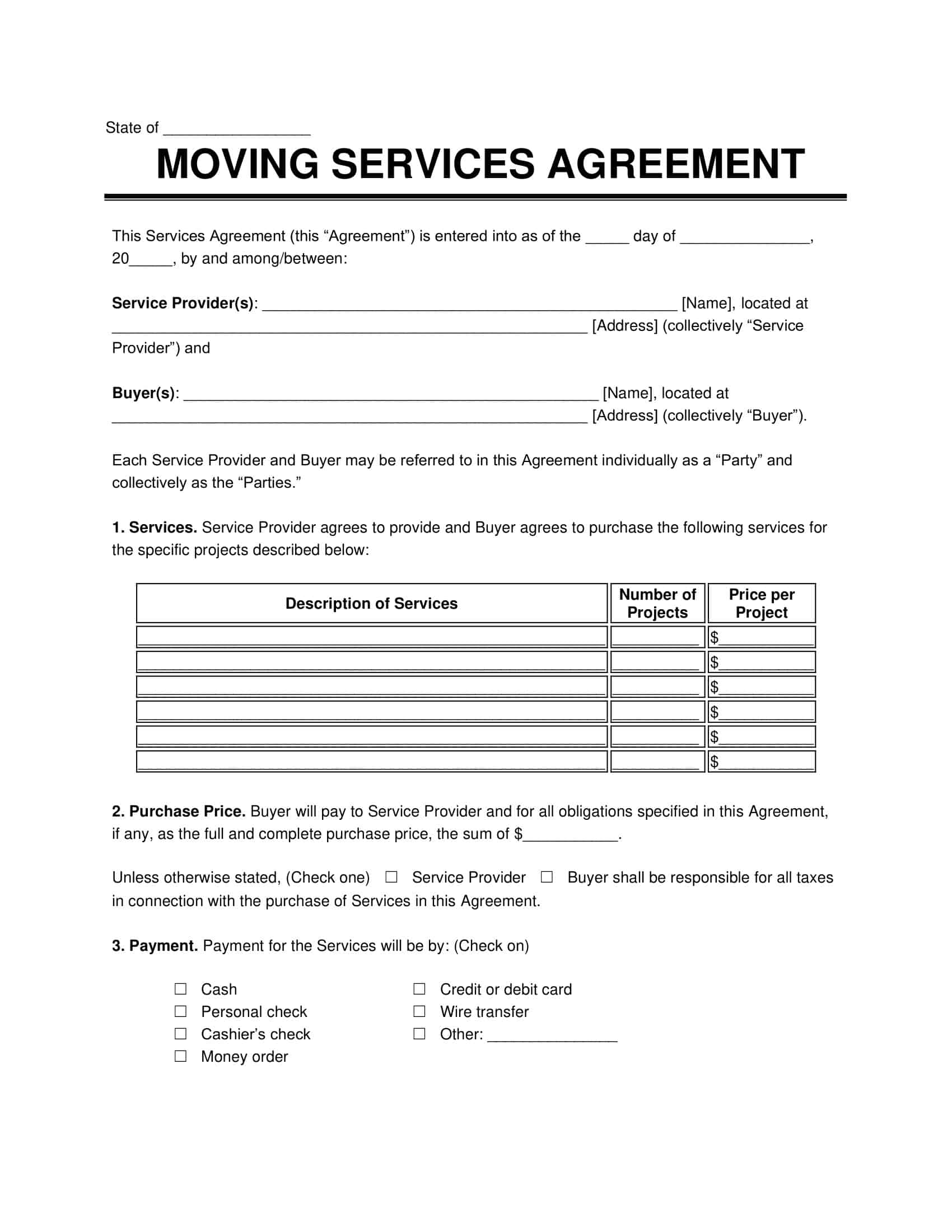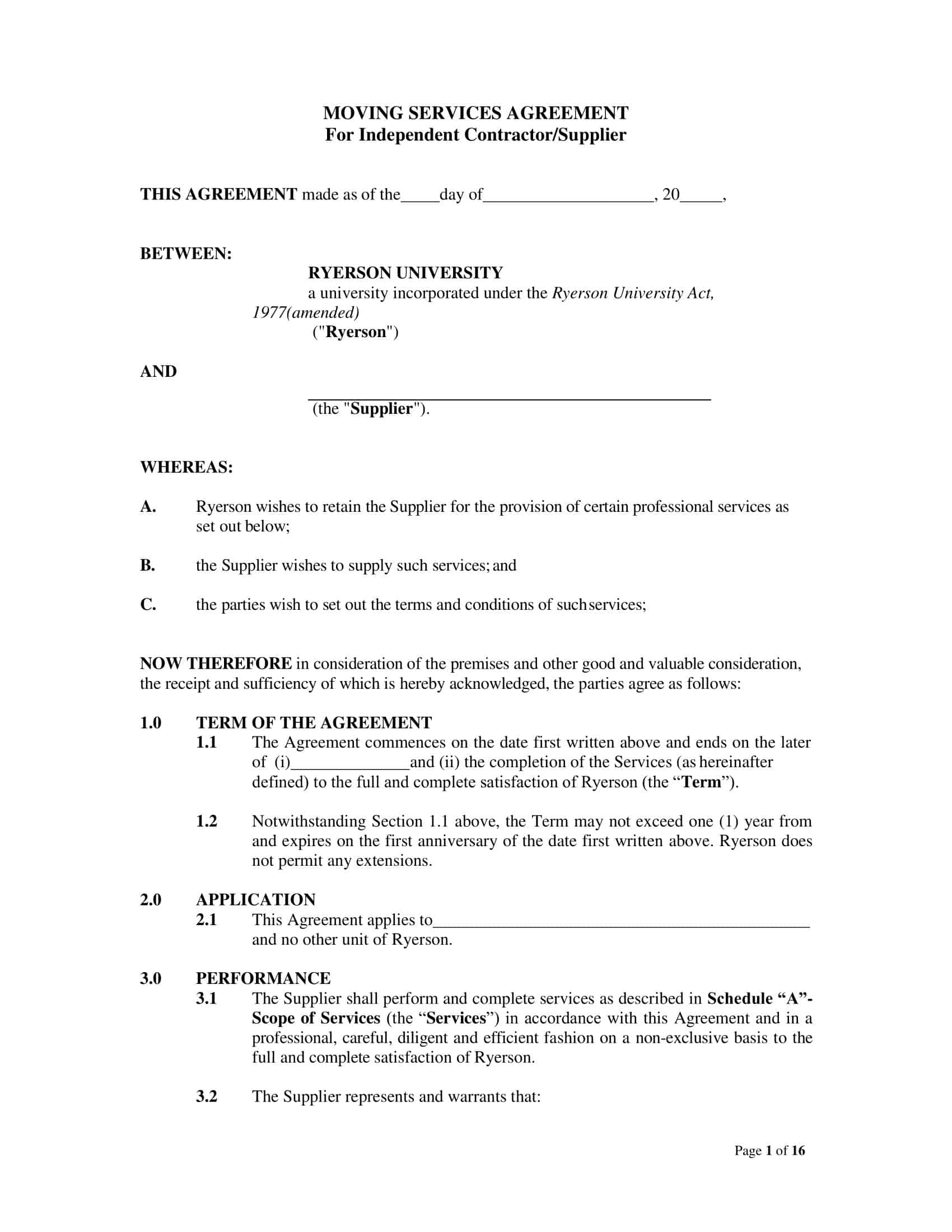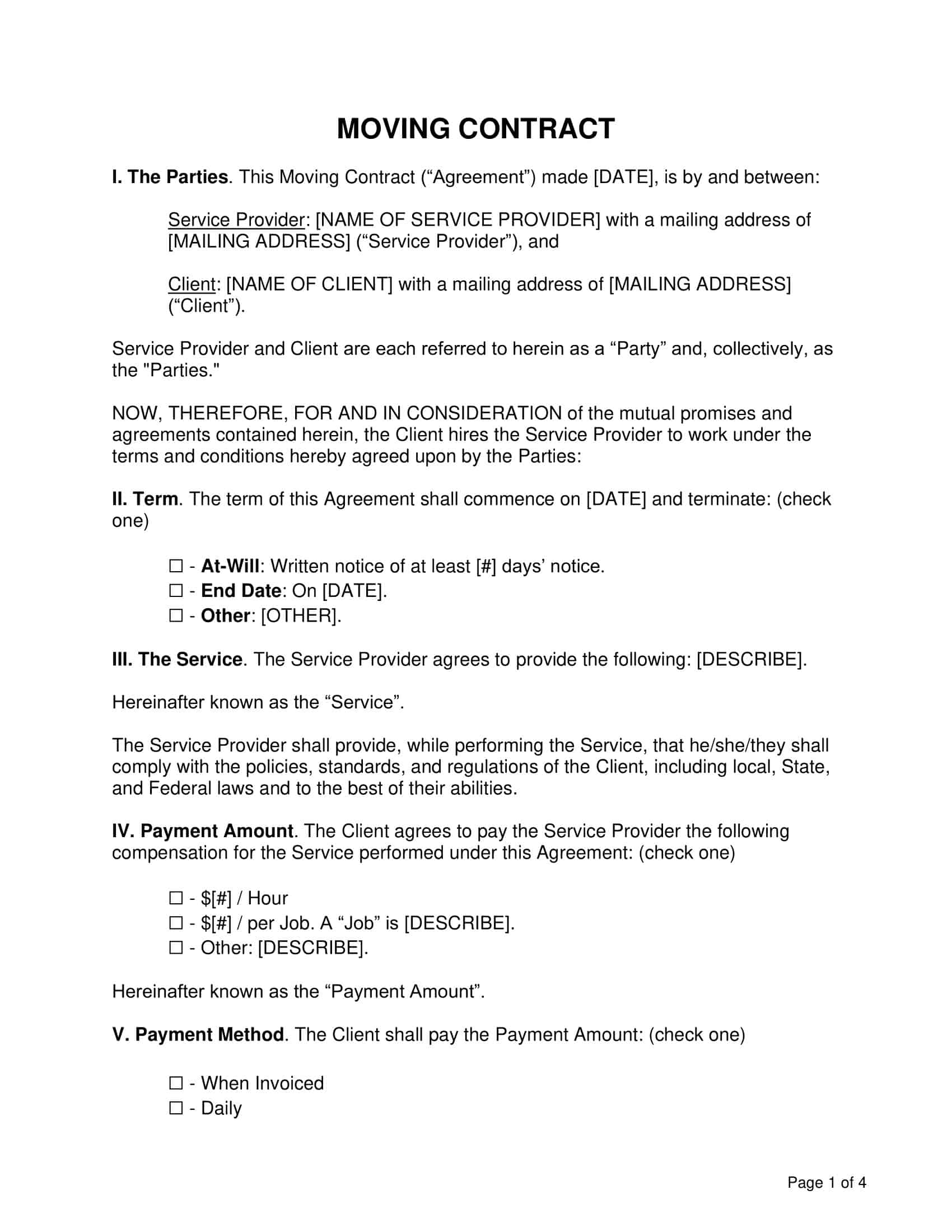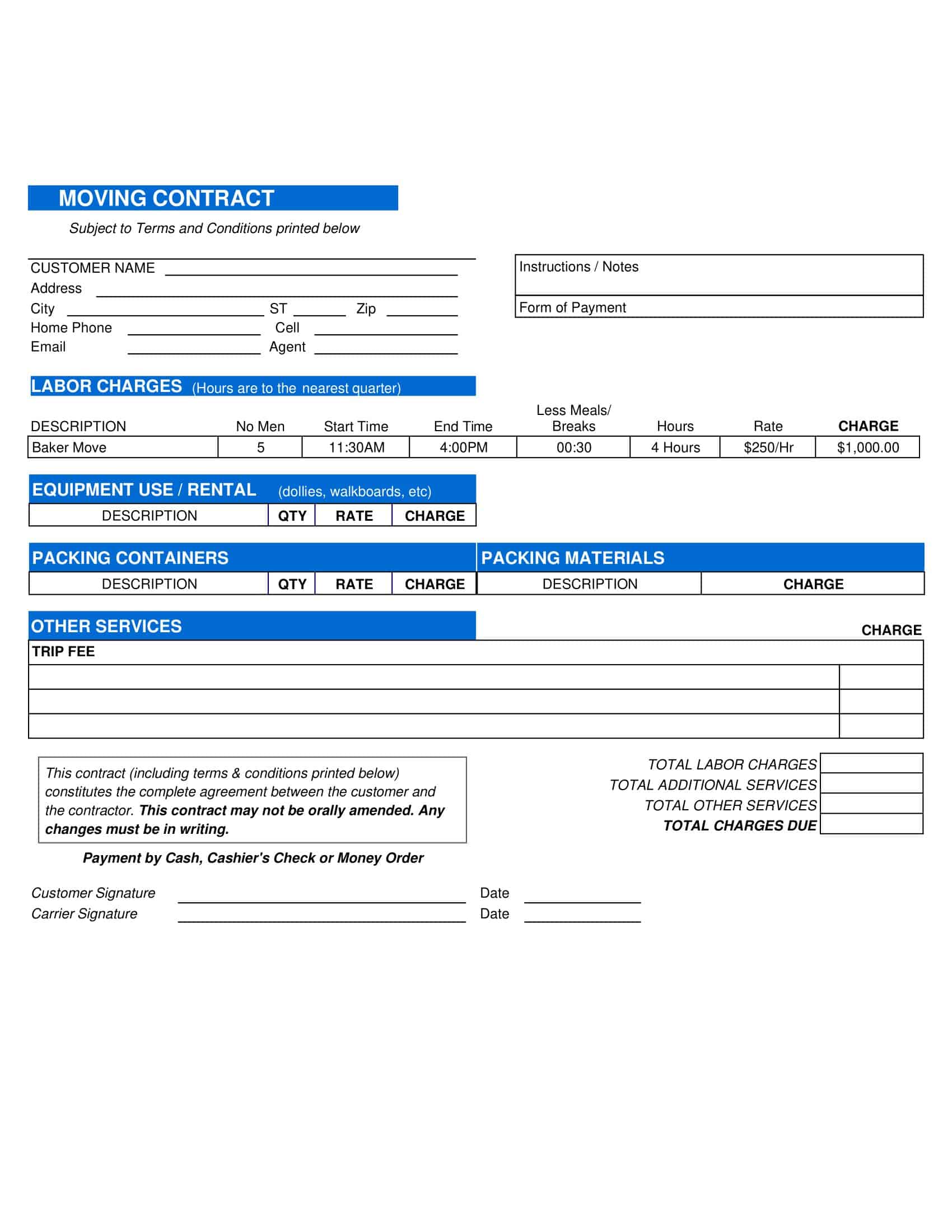If you are in the process of drafting a moving contract template, it can be tempting to simply use a pre-existing moving company contract and replicate the language included in that document. While this approach may work in certain cases, it is important to remember that each contract is unique and there may be specific considerations that need to be accounted for in your specific situation.
Relying solely on a free moving company form may give you a general idea of what should be included in the contract, but it will not provide you with the guidance needed to create a thorough and authoritative agreement. Therefore, it is recommended that you take the time to carefully consider the specific details of your move and work with legal professionals or experienced individuals to create a comprehensive and tailored contract.
Table of Contents
Moving Contract Templates
Simplify your moving process with our comprehensive Moving Contract Templates. Whether you’re a professional moving company or an individual planning a move, these printable templates provide a clear and legally binding agreement to outline the terms and conditions of the move.
Customize the templates to include important details such as moving dates, services to be provided, pricing, liability coverage, and any additional terms or provisions specific to your move. Our Moving Contract Templates help ensure a smooth and organized relocation experience, providing clarity and protection for all parties involved. Download our free templates and create professional moving contracts that make your move hassle-free and efficient.
What is a Moving Contract?

A moving contract, also known as a moving agreement, is a legal document that outlines the terms and conditions of a move from one location to another. It typically outlines the services being provided by the moving company, the cost of the move, the date of the move, and any special instructions or requests from the customer. The contract may also include information about the handling and transportation of the customer’s belongings, liability for damages, and the process for resolving disputes.
Why Is a Moving Contract Essential?
Securing a moving contract for your relocation is crucial for a multitude of reasons. By employing a moving company, you entrust them with your belongings, which will be out of your immediate supervision and control during the transition. Moreover, you rely on the moving company to responsibly pack and handle your possessions. To safeguard the interests of both parties, it is vital to establish a legally binding document that addresses potential disputes or scenarios where your belongings may be lost or damaged during the moving process.
Here are some key advantages of implementing a moving contract:
- Eliminates ambiguity regarding the duration of the moving process for both parties
- Clearly defines pickup and delivery locations
- Provides an estimated cost breakdown of the move and associated services
- Sets mutual expectations about the moving process and its execution
These various components of the moving contract serve to guarantee that all parties involved in the relocation have a clear understanding of the move’s expectations. Should any miscommunication occur later on, there exists a comprehensive document that explicitly delineates the move’s specifics and the obligations of each party to successfully complete the relocation process.
What to Include in a Moving Contract?
A moving contract serves as a legally binding document that outlines the terms and conditions of a moving arrangement between a client and a moving company. To ensure a smooth relocation process and avoid potential disputes, it’s crucial to include essential elements in the contract. Here’s a detailed guide on what to include in a moving contract:
Parties Involved:
Clearly identify the client and the moving company, including their full names, contact information, and addresses. This information is necessary for legal purposes and to ensure proper communication throughout the moving process.
Scope of Services:
Specify the services provided by the moving company, such as packing, loading, transporting, unloading, and unpacking. Additionally, mention any extra services like disassembling and reassembling furniture, storage, or handling special items (e.g., pianos, antiques, or artwork). Clearly defining the services helps avoid confusion and disagreements later on.
Moving Schedule:
Include key dates related to the move, such as the packing date, loading date, estimated transit time, and delivery window. This ensures both parties have a clear understanding of the timeline and can plan accordingly.
Pickup and Delivery Locations:
Clearly state the pickup and delivery addresses, including any specific instructions or access restrictions (e.g., narrow streets, limited parking, or building regulations). This information helps the moving company plan the logistics and avoid potential issues during the move.
Inventory List:
Provide a detailed inventory list of items to be moved, including descriptions, quantities, and approximate values. This list serves as a basis for valuation coverage, potential claims, and assists in tracking items during the move.
Valuation Coverage and Insurance:
Specify the level of valuation coverage offered by the moving company (e.g., released value, full value protection) and any additional insurance options available. Include details on the process for filing a claim, applicable deductibles, and claim resolution procedures.
Payment Terms:
Outline the payment structure, including the deposit amount, payment methods, and payment schedule. Also, mention any applicable fees, such as cancellation or rescheduling fees, and penalties for late payments.
Cost Estimate and Additional Charges:
Provide a comprehensive cost estimate, including a breakdown of charges for labor, transportation, packing materials, and additional services. Mention any potential extra charges, such as long-carry fees, stair fees, or charges for additional packing materials.
Dispute Resolution:
Include a clause that outlines the process for resolving disputes between the parties, such as mediation or arbitration, before escalating to litigation.
Cancellation and Rescheduling Policy:
Clearly state the terms and conditions for canceling or rescheduling the move, including any applicable fees and notice requirements.
Miscellaneous Provisions:
Include any additional terms or conditions relevant to the move, such as a force majeure clause, indemnification, or compliance with local regulations.
Signatures:
Ensure that both the client and a representative of the moving company sign and date the contract to make it legally binding.
Other Moving Contract Terms You Should Know
While the primary elements of a moving contract have been covered earlier, there are some additional terms and conditions that might be unfamiliar to you. You may also encounter extra binding agreements related to your move. To help clarify these terms, we have compiled a list of the most common (and potentially confusing) moving contract terms and their meanings.
Bill of Lading: The bill of lading is a vital document provided by the moving company on moving day. It serves as a receipt and a contract between you and the mover. It contains essential information such as the moving company’s contact details, pickup and delivery dates, inventory list, declared value of your belongings, and the agreed-upon terms and conditions. Make sure to keep this document safe, as it will be necessary for any potential claims or disputes that may arise during or after the move.
Supplementary Charges: Your moving contract might contain a section or subsection outlining supplementary charges, also known as accessorial charges. These are extra fees associated with specific circumstances during your move, such as navigating the truck through areas unsuitable for large vehicles or packing your belongings if you are unprepared upon the movers’ arrival.
Waybill: A waybill is a version of your moving contract provided on moving day. It contains the previously discussed sections and should be kept as a receipt for your service.
Guaranteed Estimate: A guaranteed estimate ensures that the price stated on the moving contract is the amount you will pay. To modify this price, the moving company must propose an amendment to the contract, which both parties must sign.
Full-Value Protection and Released-Value Protection: Moving companies offer two types of coverage for clients: full-value protection and released-value protection. Check your contract documents to see which option your mover has agreed to. With full-value protection, you will receive the full value or replacement value of any damaged items, typically up to around $100 per pound. With released-value protection, you will receive a significantly lower amount—approximately $0.60 per pound.
High-Value Inventory: Your mover may include a high-value inventory list in the contract. This list should detail the items they will be moving and their respective values. Additional costs related to packing or moving these items may apply, along with specific terms and conditions.
Transportation Charges: These charges pertain to the distance the moving company will transport your belongings and the overall weight of the shipment.
Flexible Estimate: A flexible estimate is a payment estimate that may change during the service, meaning the listed amount is not guaranteed. However, the Federal Motor Carrier Safety Administration implemented the 110% rule in 2013, stating that the final amount owed cannot exceed 110% of the estimated price.
Appraisal: The appraisal refers to the declared value of your belongings. In the event of damages, the movers will not be liable for an amount exceeding the appraisal.
A Comprehensive Guide to the Moving Terms
Understanding the roles and differences between moving brokers, moving companies, shippers, and carriers is essential when planning a move. This comprehensive guide will help you distinguish between these terms and make informed decisions during your relocation process.
Moving Broker vs. Moving Company
Moving Broker:
A moving broker is a third-party intermediary that connects clients with moving companies. Their primary function is to help customers find suitable moving services based on their needs, budget, and location. Moving brokers do not own trucks or employ movers, and they do not perform the actual move. Some key points about moving brokers include:
They have extensive networks of moving companies, allowing them to find the best fit for your specific requirements.
They can save you time by researching and contacting multiple moving companies on your behalf.
They may be able to negotiate better rates for moving services.
It is crucial to verify that the moving broker is licensed with the Federal Motor Carrier Safety Administration (FMCSA) before working with them.
Moving Company:
A moving company is an organization that provides moving services, including packing, loading, transporting, unloading, and unpacking of your belongings. They have their own trucks, equipment, and trained personnel to execute the move. Some key points about moving companies include:
- They offer a range of services, from basic transportation to full-service moves.
- Moving companies are responsible for the entire moving process, from planning to execution.
- They are required to be licensed and insured, ensuring compliance with regulations and protection for your belongings.
- It is essential to research and compare multiple moving companies to find the one that best suits your needs and budget.
Shipper vs. Carrier
Shipper:
A shipper is an individual or company that needs to transport goods from one location to another. In the context of moving, you (the client) are the shipper. As a shipper, you are responsible for:
- Providing accurate information about your belongings and their value.
- Preparing your belongings for transportation, including packing and labeling.
- Communicating your expectations and requirements to the moving company or broker.
- Ensuring that the moving company or broker you choose is licensed, insured, and reputable.
Carrier:
A carrier is the party responsible for physically transporting the goods. In the moving industry, the carrier is typically the moving company that owns the trucks and employs the personnel to handle your move. Carriers have specific responsibilities, such as:
- Ensuring the safe and timely transportation of your belongings from the pickup location to the delivery location.
- Providing necessary equipment and personnel to execute the move.
- Offering valuation coverage and insurance options to protect your belongings during transit.
- Complying with federal and state regulations, including obtaining proper licensing and maintaining a safe operating record.
To sum up, understanding the differences between moving brokers, moving companies, shippers, and carriers is essential when planning a move. Moving brokers connect you with moving companies, while moving companies are responsible for executing the move. As the shipper, you are responsible for your belongings and choosing a reliable carrier to transport them. By knowing these distinctions, you can make informed decisions and ensure a smooth relocation process.
FAQs
Can I negotiate the terms of a moving contract?
Yes, you can negotiate the terms of a moving contract before signing it. It’s essential to discuss your needs, concerns, and preferences with the moving company to ensure the contract accurately reflects your expectations and requirements.
What is the difference between a binding and non-binding estimate in a moving contract?
A binding estimate guarantees that the price listed on the moving contract is the price you will pay, while a non-binding estimate is an estimated cost that may change during the move. The final amount of a non-binding estimate cannot exceed 110% of the estimated price, as per the Federal Motor Carrier Safety Administration (FMCSA) regulations.
What happens if my belongings are damaged during the move?
If your belongings are damaged during the move, you can file a claim with the moving company, based on the valuation coverage and insurance options specified in the moving contract. The moving company is responsible for compensating you according to the agreed-upon coverage.
Can I cancel or reschedule my move after signing the contract?
Yes, you can cancel or reschedule your move, but the moving contract should specify the terms and conditions for doing so, including any applicable fees and notice requirements.
What if I have a dispute with the moving company?
If you have a dispute with the moving company, refer to the dispute resolution process outlined in the moving contract. This may include mediation, arbitration, or litigation. Always try to resolve issues amicably before escalating to legal action.
How can I ensure that the moving company is reputable and trustworthy?
Before signing a moving contract, research the moving company’s reputation, check for licensing and insurance, read customer reviews, and ask for referrals from friends or family. Verify the moving company’s licensing status with the FMCSA or your state’s regulatory agency.







































![%100 Free Hoodie Templates [Printable] +PDF 1 Hoodie Template](https://www.typecalendar.com/wp-content/uploads/2023/05/Hoodie-Template-1-150x150.jpg)
![Free Printable Catering Contract Templates [Word, PDF] Simple 2 Catering Contract](https://www.typecalendar.com/wp-content/uploads/2023/05/Catering-Contract-1-150x150.jpg)
![Free Printable Land Contract Templates [Word, PDF] Simple 3 Land Contract](https://www.typecalendar.com/wp-content/uploads/2023/05/Land-Contract-1-150x150.jpg)
